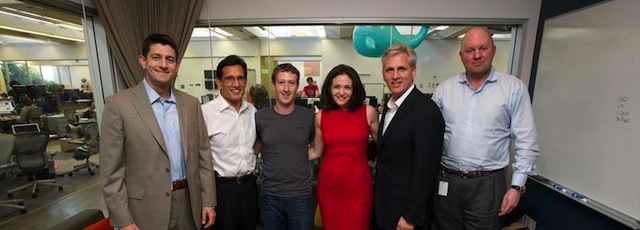Facebook founder Mark Zuckerberg made headlines today on the announcement of his new technology lobby, FWD.us, that he formed with his powerful Silicon Valley friends. But, behind the starstruck stories of DC’s new power players, it should be noted that the technology industry already has a litany of lobbies, comprised of the same board members as FWD.us, who have been active in politics for years. Before everyone gets carried away, it’s worth understanding what tech money has gotten Silicon Valley already and what FWD.us will need to do to distinguish itself.
What Already Exists

The technology industry is handsomely represented in the halls of Congress. According to OpenSecrets, the industry’s lobbying coffers shoveled out $202 million in 2012, almost twice as much as in 2004 ($105M). Facebook even has its own Political Action Committee to fund specific candidates. And, to be sure, most major tech corporations have swanky DC diggs, where they throw elaborate champagne parties on rooftop decks (I have enjoyed their expensive appetizers many times).
In addition in-house teams, there are a number of similar independent lobby groups, including the Internet Association, Engine Advocacy, TechNet, The Consumer Electronics Association, and The Silicon Valley Leadership Group–to name a few. Yahoo CEO Marrissa Mayer, a member of Zuckberg’s FWD.us, also sits on the board of Technet.
Like the tech companies themselves, the varying lobbies disagree on thorny issues such as the Internet sales tax, which pits eBay against its digital rival, Amazon. But, there’s far more agreement than disagreement, especially on immigration reform.
Immigration Reform Has Advocates Far More Powerful Than The Tech Titans
FWD.us’s topic du jour is high-skilled immigration reform, which the entirety of the tech industry has been pushing for, for decades. As Zuckerberg echoed in his Washington Post OpEd, “To lead the world in this new economy, our workforce needs the most talented and hardest-working people. We need to train and attract the best.”
Yet, despite a full court press by the most of the industry, and (an arguably more powerful) ally in New York City Mayor, Michael Bloomberg, proponents of high-skilled immigration reform have yet to be successful. Last Winter, a bill, which aimed to expand high-skilled visas to more foreign-born science and engineering graduates of American universities, died largely because all the money in the world couldn’t get Democrats and Republicans to agree.
We held a debate between high-skilled immigration reform expert, Vivek Wadhwa and Congressman Gutierrez, for those readers who want to learn more about the disagreement over whether to prioritize high-skilled immigrants over their low-skilled counterparts.
Principled differences aside, the Latino-American population is now powerful enough to swing Presidential elections, so politicians want to take their concerns seriously (which President Obama pretty much admitted, in recorded off-the-record remarks).
As a result, this year, the 85,000 visa quota for high-skilled immigrants was maxed out in just 5 days. Evidently, tech, and its DC money, has limits.
Board Members Are Individuals First And Mostly Democrats
Despite what may seem like a unified front, the 30 all-stars have their own agenda. Most FWD.us members, like Google Chairman Eric Schmidt, are reliable Obama backers. According to OpenSecrets, the communications and electronics industry gave nearly twice as much to Democrats ($93M) as they did to Republicans ($55) in 2012.
As we’ve written about before, technologists’ aversion to conservatives is largely principled, and no amount of money or peer-pressure will convince them to back Republicans.
Other board members simply have their hands’ full with their own issues. Zynga’s CEO, Mark Pincus, will likely be lobbying for online gambling and can’t expend too much political capital on anything else.
FWD.us Could Be Different
The bright folks at FWD.us are no tourists of the political landscape. But, to distinguish themselves, they’ll need at least one of a few proof-points
- Get the board members vocal in non-generic ways. Zuckerberg’s Washington Post OpEd was elegant and powerful, but it didn’t say anything new. In order for the message to get into the DC psyche, FWD.us members need to be the epicenter of bold, sticky ideas.
- A viral campaign. FWD.us is smartly targeting Silicon Valley’s employees in a grassroots campaign, many of whome are personally impacted by immigration reform. Last Election, Ron Conway’s Sf.citi managed to score a win at the ballot box for a local tax measure by reaching out directly to the citizens of San Francisco. Bloomberg has his own immigration-themed social media campaign, The March For Innovation; it’s unclear whether FWD.us will compliment or compete with Bloomberg.
- Nonpartisan cash. Most members are Democrats, but sometimes small-government Republicans are better on tech issues. I’d be impressed if FWD.us could get board members to contribute to someone like Congress’s resident tech guru and part-time Obama nemisis, House Oversight Chairman, Darrell Issa. In order for policymakers, especially Democrats, to take FWD.us seriously, they’ll need to believe the money isn’t already coming their way.
FWD.us could be a power player. But, the mere presence of fancy board members hasn’t proved they’re anything unique yet. We’ll keep you posted.
